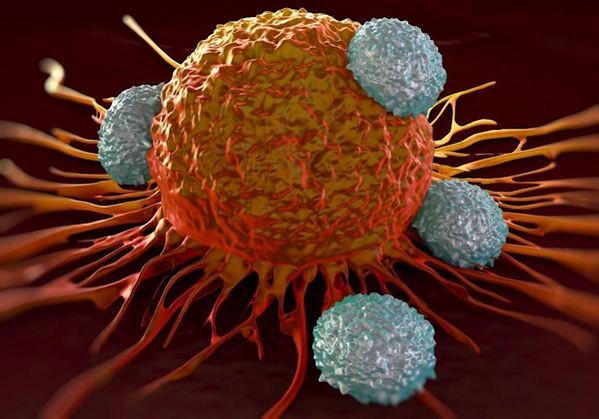Published by Bindi M. Doshi, PhD on Mar 30, 2023 8:57:42 AM

MHC-peptide exchange is considered to be tricky by researchers. However, with the right set of tools and protocols, this peptide-MHC exchange can be done easily, quickly, and provide robust information. Recent publications highlight how various researchers have used QuickSwitch™ kits for their applications.
KRAS Mutation Displayed As Neo-Antigens By T Cells
Globally, mutations in Ras genes account for around 3.4 million cancer diagnoses each year with KRAS mutations comprising roughly 75% of that total (1). KRAS mutations take place in many common cancers, such as non-small cell lung cancer, colorectal cancer, and pancreatic ductal adenocarcinoma, making them a favorable therapeutic targets. Immunotherapies and therapeutic modality targeting KRAS mutations were developed to control tumor cells in particular T cell immunotherapy targeting KRASG12D/V mutations in the context of specific human leukocyte antigen (HLA) molecules (2). More data highlighted the HLA molecules can display KRAS mutant peptides (referred to as “neoantigens”) at levels recognizable by T cells leading to a focus on T cells targeting KRAS mutations (2).
In a recent publication by Wang et al., 2022, (3) the KRAS driver mutation was examined as it is thought to generate T cells specific for this shared neo-antigen. The QuickSwitch Quant HLA-A*11:01 Tetramer Kit-APC (TB-7304-K2) identified 9-mer and 10-mer of G12V KRAS to measure CD8+ HLA-A*11:01 T cells. However, stimulation with K562-based aAPC led to a rapid loss of specificity to mutant KRAS. To selectively expand neo-antigen-specific T cells, particularly m KRAS, from the TILs, a novel method was developed to generate TIL cultures specifically reactive to mKRAS(G12V). It is now hypothesized that autologous TMG-T cells provide a reliable source of autologous APC to expand a rare population of neoantigen specific T cells in TILs.
Prior, Ian A., et al. “The Frequency of Ras Mutations in Cancer.” Cancer Research, vol. 80, no. 14, 2020, pp. 2969–2974., doi:10.1158/0008-5472.can-19-3682.
Yossef, Rami, et al. “Enhanced Detection of Neoantigen-Reactive T Cells Targeting Unique and Shared Oncogenes for Personalized Cancer Immunotherapy.” JCI Insight, vol. 3, no. 19, 2018, doi:10.1172/jci.insight.122467.
Wang, Sizhen, et al. “Expansion of KRAS Hot Spot Mutations Reactive T Cells from Human Pancreatic Tumors Using Autologous T-Cells as the Antigen-Presenting Cells.” 2022, doi:10.21203/rs.3.rs-1944651/v1.
High Throughput Screening Using QuickSwitch™ Kit
Genomic analyses have become an impactful driver of cancer for mutation identification and targeted therapies. Still, recent developments in proteogenomic permit further study of post-translational modifications with genomic, epigenomic and transcriptomic data. As a result, current technologies require high throughput screening to integrate proteomic with genomic data in translational studies and immuno-oncology to move closer to innovative diagnostic and therapeutic opportunities.
We are proud to share this new and innovative article from Cancer Cell that uses our highly acclaimed QuickSwitch Quant tetramer Kit to perform high throughput screening of HLA-A2 and HLA-A24 binding peptides in the proteogenomic characterization of intrahepatic cholangiocarcinoma (1).
Dong, L., Lu, D., Chen, R., Lin, Y., Zhu, H., Zhang, Z., Cai, S., Cui, P., Song, G., Rao, D., Yi, X., Wu, Y., Song, N., Liu, F., Zou, Y., Zhang, S., Zhang, X., Wang, X., Qiu, S., … Fan, J. (2022). Proteogenomic characterization identifies clinically relevant subgroups of intrahepatic cholangiocarcinoma. Cancer Cell, 40(1). doi.org/10.1016/j.ccell.2021.12.006
Cancer Neoantigen Discovery with QuickSwitch™ Kit
With the advent of new technologies, it’s become more evident that human cancers are very complex, bearing thousands of mutations. These mutations and expression of non-synonymous mutations can produce tumor-specific antigens called neoantigens. The neoantigens are endogenously processed and presented to T cells, subsequent T cells recognize target cells. According to the profile of detected tumor mutations, a personalized cancer vaccine could be designed to target the specific epitopes of neoantigens against cancers. To identify and predict the affinity of neoantigens to major histocompatibility complexes (MHCs) or the immunogenicity of neoantigens requires a combination of algorithms and whole-exome sequencing technology. Still, the epitope mapping and MHC/neoantigen binding necessitate validation beyond software predictions.
Zang et al., 2022 predicted neoantigens for colorectal cancer (CRC). The predicted peptides were synthesized, and their MHC binding affinity was assessed using QuickSwitch™ Quant Tetramer Kit. The results showed in 6 patients that neoantigen peptide KLDLKVPKA of the AHNAK2 gene, which was found in both the scWES and targeted exome-seq data, had high peptide exchange (88.16% vs. 66.01% for the wild peptide), indicating higher binding affinity with MHC class I . Likewise, other neoantigen peptides in the AHNAK2, PTPRF, and NPIPA5 genes were predicted with scWES or TES data, furthermore, showed high peptide exchange. These identified and validated CRC neoantigens may elicit an immune response leading to the potential progression to a vaccine
Zhang, Xiaoyan, et al. “Single-Cell Sequencing Reveals cd133+cd44−-Originating Evolution and Novel STEMNESS Related Variants in Human Colorectal Cancer.” EBioMedicine, vol. 82, 2022, p. 104125., doi:10.1016/j.ebiom.2022.104125
The publications above provide a snapshot of recent publications using MBLI's QuickSwitch kit. View even more citations on our website, find current QuickSwitch kit offering, or contact us for personalized support.

